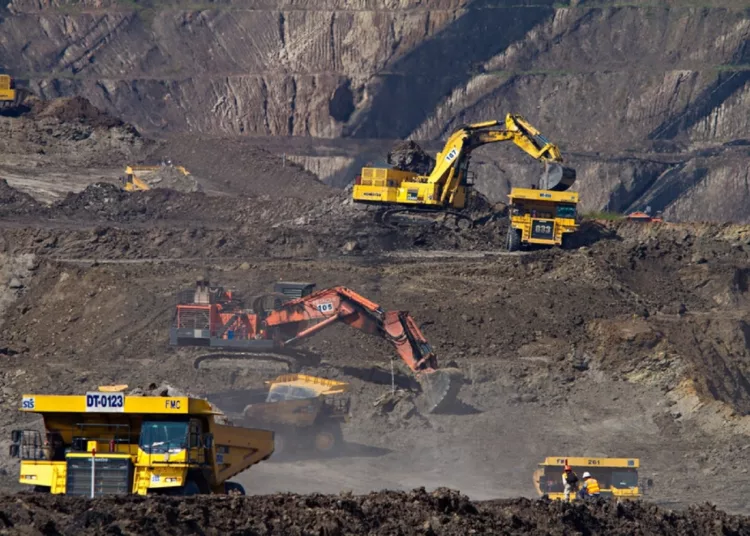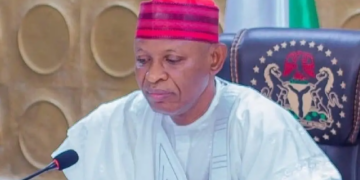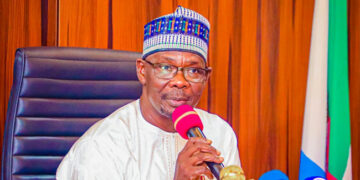Mining stakeholders under the Miners Association of Nigeria (MAN) have expressed deep concern over developments in the minerals and mining sector which they say are counter-productive in the ongoing efforts by government to reposition the sector into becoming Nigeria’s top income earner.
Briefing journalists on Wednesday in Abuja, the group, comprising Presidents of Associations of Investors and Professionals, representing the critical mass of mining companies, investors and professionals in the industry, led by the President of MAN, Dele Ayanleke, however praised some key achievements of the Minister of Solid Minerals Development since the assumption of office of the minister of solid minerals development, Dr Oladele Alake.
However, the president of the Nigerian Mining and Geosciences Society (NMGS), Prof. Akinade Olatunji, who delivered the address, said after critical consideration of the trends of events in the sector, they decided to draw the government’s “attention to some unwholesome developments that are of grievous concern to stakeholders and offer recommendations for urgent remediation to arrest a further drift of the sector which has not fully resurged from the coma of decades long abandonment”.
First on the eight issues raised by the group was unwholesome interference of state governments in mining operations within their territories as they alleged that virtually all the states of the federation have in the past few years indulged in acts that have snowballed into control and regulation of mineral operations within their territories, thus interfering with the activities of duly licensed operators across the country.
These interferences are manifest in several forms including: establishment of ministries, departments or agencies, MDAs, for minerals and mining by state governments and requesting that all duly licensed operators should register with such state-run MDAs; closure of operational sites using law enforcement agents and task forces not known to extant industry regulations; confiscation of lawfully mined products from operators without reasons; brutalisation of personnel of operators in some instances, vandalisation and setting on fire of hard-earned equipment; and using the state apparatus to institute frivolous court cases against operators,” the group explained.
They noted that the development is in breach of the provisions of the extant law and the Mining Act 2007 which placed the administration and regulation of mining operations on the shoulders of the federal government, hence it should be addressed forthwith in the overall interest of economic development.
The group also faulted what it called non-involvement of stakeholders in the ongoing review of mining laws
“As stakeholders, we wish to point your attention to the fact that the processes of the review of the Minerals and Mining Act, 2007 and the consideration of the two Bills to establish Mining Company/Corporation/Authority before the National Assembly are not all-encompassing enough to capture the opinions of a broad spectrum of industry stakeholders,” Prof. Olatunji noted.
According to him, the all-inclusive approach adopted in the past led to the formulation of the present Mining Policy that birthed the enactment of the NMMA 2007 and NMMR 2011, resulting in widely acceptable law and regulations touted as an excellent piece of legislation even by foreign investors.
“Given the passage of time since 2007 and the many developments that took place in the sector over the years, it is believed that certain amendments to the 2007 legislation may be due. However, it would be helpful if key stakeholders are consulted for input into the emerging legislation as more fundamental issues need attention as opposed to what is being proposed by the National Assembly,” the group said.
They equally kicked against the recent upward review of the rates of fees, rents and royalties in the mineral resources sector that was done without consultation with stakeholders, irrespective of the well-publicised claim to the contrary.
According to them, the minister only mentioned the planned hike to them at a meeting, but not a copy of the new rate was seen, let alone discussing it.
The said the astronomical hike in rates did not take into cognisance the high risk-cum-long gestation nature of mining, the current inclement economic climate in the country and the dire need to nurture the struggling Nigerian Miners.
“We seek the constitution of an ad-hoc committee consisting of the representatives of ministry and the private sector where members will brainstorm on the desirability for an increase and the quantum of increase for each category of fee/rent/royalty that the operators can absorb without an existential threat to their businesses,” the group said.
And while commending the establishment of the Special Mining Marshalls on the ground that it would enhance the capacity of the ministry to effectively undertake its regulatory role, the group however recommended that the two departments in the ministry that are statutorily empowered to regulate mining operations and environmental compliance, the Mines Inspectorate, MI, and the Mines Environment Compliance, MEC, respectively, which are staffed by well trained professionals with experience in operational guidelines and procedures, be made to function as a back-up force to support the two Departments and their Officers in the Federal Mines Offices located in the states.
“The non-alignment of the operations of the Mining Marshals with the supervisory and inspectorate functions of the MI and MEC will be counter-productive and create operational chaos in the sector and endanger the investment of lawful operators,” the group noted.
The group also sought clarity regarding the value addition policy of the ministry, saying the introduction of the value addition policy without precise specifications as to the type and level of processing required is de-marketing the Nigerian mineral production.
They urged the ministry to, as a matter of urgency, accelerate efforts at the establishment of the envisaged mineral processing centres and possibly upgrade the mineral buying centres established in the geopolitical zones to accommodate processing facilities.
Other issues raised for urgent attention to be addressed included, the centralisation of the approval of some mineral titles, permits and certificates in the Ministry, which the group claimed is not only inimical to the extant laws and regulations but has also increased the waiting time for obtaining the necessary documents to facilitate mining businesses in Nigeria; the need for a change in approach to policy formulation; and non-disbursement of federal government funding interventions for Artisanal and Small-Scale Miners, ASMs.
“The minister is requested to kindly note that the N2.5 billion warehoused with the Bank of Industries for mining projects has not achieved its purpose as the funds have continued to be inaccessible to the intended beneficiaries.
“We call on the minister to please allow the SMDF, Solid Minerals Development Fund, to take direct control of this fund and direct it to review the procedure for accessing it, aimed at making it more accessible to mining operators in line with the provisions of the law establishing it.











